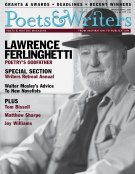"I thought it was extraordinary," Caputo says, "and I told him so. Now my worry was that he would forge ahead with a career as a writer, knowing how difficult that is."
So he gave Bissell some guarded advice. "At the same time I encouraged him," Caputo says, "I discouraged him. I told him my own philosophy: Anyone who wants to become a writer will not become a writer. The only people who become writers are those who have to. You almost cannot do anything else. And if Tom were to discover that to be true, he should go ahead.
"And he did."
"I remember the day Iowa rejected me," says Bissell, who, near the end of his time at Michigan State, began sending out applications to MFA programs at Columbia, Michigan, and Iowa. "I was so confident that I was going to Iowa right out of college that it didn't occur to me that I might not get in. When I didn't get in, I actually called the school and was put through to Frank Conroy. I could tell he got a lot of these calls. He just said, ‘Look, I'm sorry, it's a crapshoot. Apply again next year.'" Bissell received rejections from all of his chosen schools.
But then one of his professors at Michigan State invited a woman who'd been in the Peace Corps to talk to Bissell's class. Bissell knew Shacochis had been a volunteer in the Caribbean, so he wrote to him asking if he should join. Shacochis sent back a postcard that simply said, "Yes." Not knowing what else to do, he signed up.
"I figured once I joined the Peace Corps," Bissell says, "I would have something to write about. And Holy God, did I get a lot to write about. I got so much that I only recently stopped writing about it." In 1996 Bissell went to Uzbekistan. He was stationed in the regional capital of Gulistan and determined to make the most of it. "If the sea for Melville was ‘my Harvard and my Yale,' I believed I could make Gulistan my Boston College and my University of Connecticut," Bissell wrote in his first book, Chasing the Sea: Lost Among the Ghosts of Empire in Central Asia (Pantheon, 2003), in which he revisited the region.
But soon after arriving in the middle of Uzbekistan, Bissell started to feel more like Melville's castaway Pip than Melville himself. Beset first with gastrointestinal problems, then more serious mental ones, Bissell sank into a depression so black that he was almost sent home. He rallied, but then came another long downhill slide that would end with his having lost fifty pounds. One of the short stories he wrote at the time was about a boy who grew up in Michigan but for some reason went to Uzbekistan, where his character broke and was never the same again. After eight months, Bissell was on a plane heading back to Escanaba, where the paper mill rejected him and Harper's, finally, accepted him.
"That's when I really had to look at the guy closely," says Shacochis. "He had just been a tobacco-chewing, mullet-haired, heavy-metal geek from northern Michigan. But when he became an intern at Harper's, my God. You have to be one of the smartest people on earth to get that. In fact, you have to be smarter than the editors there!"
And so things slowly started to turn around for Bissell, who happily took up his chair in the intern room, where he helped compile the Harper's Index, sorted through the slush pile, typed up rejection letters, and did the grunt editorial work for four months, before heading off to work at W. W. Norton as an editorial assistant.
Within a few years of coming to New York, Bissell was hired as an editor at Henry Holt. He was still writing on the side, working on a collection of short stories as well as a novel (his fourth) about the Apostle John. No one wanted to publish either one. "That was extremely hard," Bissell says, "because by this time I was an editor, and I knew these other editors. Some of them were my friends—some very good friends—and no one wanted to buy my books."
Instead, Bissell's nonfiction, his journalistic work, is what garnered attention. He hadn't written much of it—just a bookish essay in the Boston Review about getting Paula Fox's work back in print—but he persisted. And when he heard that the actor Jeff Daniels was filming a movie about deer hunting in Escanaba, he called his old friend from the Harper's intern room, Donovan Hohn, who was now an assistant editor at the magazine, and told him he wanted to write an article about the filming of Escanaba in da Moonlight.








